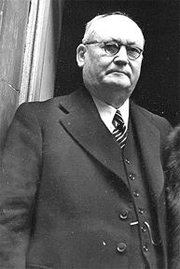|
|
Daniel Franšois Malan (22 May 1874 – 7 February 1959) was a Prime Minister of South Africa. He is seen as the champion of South African nationalism, and the government under him started implementing apartheid.
Malan was born in Riebeek-Wes in the Cape Province. He obtained a B.A. in Arts and Science and a M.A. in Philosophy at the Victoria College, later to be Stellenbosch University. After obtaining his Doctor of Divinity at the University of Utrecht in 1905, he was ordained as a minister of the Dutch Reformed Church. He was an ardent fighter for the acceptance of Afrikaans, which was an emerging language fighting against Dutch and English, and established the Afrikaanse Taalvereniging in 1906. He was stationed in Montagu until 1915, and he traveled for several years as a missionary throughout South Africa, visiting the Belgian Congo and Southern Rhodesia as well.
The Union of South Africa was created on 31 May 1910, eight years after the end of the disastrous Boer Wars, with Louis Botha as the first prime minister. In 1915, J.B.M. Hertzog broke his ties with Botha and formed the National Party. Malan entered the political arena when he joined the National Party and became the first editor of its mouthpiece, Die Burger, a newspaper which supported the nationalist cause. After becoming leader of the National Party in the Cape of Good Hope district, Malan was elected to Parliament in 1918. By this time he had also become a member of the Afrikaner Broederbond.
The National Party came to power under the leadership of Hertzog in 1924, and Malan was given the post of Minister of the Interior, Education and Public Health, which he held until 1933. In 1925, Malan was at the forefront of a campaign to replace Dutch with Afrikaans in the constitution.
In 1934, the United Party was formed out of the merger between Hertzog's National Party and the rival South African Party of Jan Smuts. Malan strongly opposing the merger, himself and 19 other MPs defected to form the 'Purified' National Party, which he led for the next fourteen years as opposition. Malan also opposed South African participation in World War II, which was already unpopular among the Afrikaner population; this dramatically increased his popularity, and he consequently defeated Smuts and the United Party in 1948.
After coming to power and leading for six and a half years, a firm foundation for apartheid was laid. The system was only officially disbanded in 1994, but the effects were to last much longer. Malan retired in 1954, aged 80, handing over the reins to J.G. Strijdom.
He died in 1959 at M˘rewag, his home in Stellenbosch. His book, "Afrikaner Volkseenheid en my ervaringe op die pad daarheen", was published in the same year by Nasionale Boekhandel. A collection of his writings and documents is housed at the D.F. Malan Gedenksentrum, a memorial centre forming part of the University of Stellenbosch.
| Preceded by: Jan Smuts | Prime Minister of South Africa 1948–1954 | Succeeded by: Johannes Gerhardus Strijdom Template:End boxfr:Daniel Franšois Malan nl:Daniel Franšois Malan |

